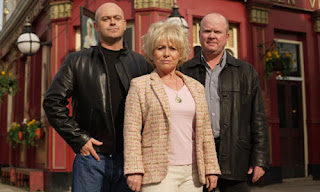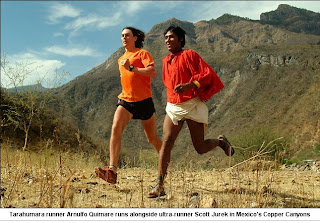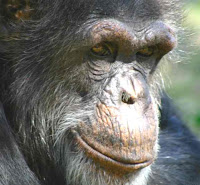Giving Up Smoking
I recently suffered a relapse and started smoking again, but yesterday I embarked on perhaps my fourth attempt this year to give up. I've done reasonably well so far in 2010 and have probably only smoked for about two months of it all together. But, ultimately, I have not fully escaped the slavery of nicotine addiction; at least I can fall back into it very easily.
As you know, I'm training for my first half-marathon and have the Race for Life coming up soon. However, with falling into full-time smoking, I also fell out of the habit of running every other day. My running buddy happened to be on holiday for a couple of weeks, so I got lazy and didn't train at all. He returned this week and we returned to the local park, where I was to discover just how much the smoking has damaged my fitness progress.

I'd been training for about six weeks and had reached a point where I could easily run 5km in one go. After just 2 weeks or so of full-time smoking, I can only do 0.75km before my lungs have had enough and I've got to walk a bit. My muscles are fine and I've been doing a spot of kettlebell training during the relapse that's kept them in relatively good nick despite my smoking. But my lungs can not handle it. Seriously, I almost felt like I was going to have an asthma attack and I don't even have asthma. I got the slightly sicky feeling you get when you're pushing your body to it's max. Experiencing the negative effects of smoking in such a measurable way has prompted me to kick the habit again. But this time, I have to make sure that I don't fall back into it.
This is my guide to giving up; how I've gone about it before and what I hope to do this time to make sure it is the last time.
The Right Mindset
First and foremost, the key to giving up successfully is well and truly
wanting to do so. 100%, not a doubt in your mind, you don't want to smoke any more. I have never used nicotine replacement therapy of any kind. Instead, each time I've given up, I have put serious thought into why I'm smoking, why I don't want to and my fundamental beliefs about respecting my body and keeping it in good condition. I convince myself entirely of why I don't want to smoke anymore and then when I decide once and for all, it is easy. I have cravings but they don't bother me because I'm focussing on the bigger picture.
My method could be crticised since I have never sustained giving up permanently, however, I believe that getting into the right mindset is the easiest way to making the first step.
There are many ways to do this. By far the most successful book I have heard of is Allen Carr's 'The Easy Way to Give Up Smoking'. I have read about a quarter of it and did give up afterwards. I found it a bit monotonous and repetitive, but I think the aim is that it reprograms your thinking in doing so. A number of people I know have cited this book as the reason they quit and having read it all the way through, none of them have relapsed. If I could recommend one self-help book for smoking, it would be this one.
Other ways to get yourself into the right mindset could include a fitness goal, such as running a marathon or climbing a mountain, or something that requires you to start taking care of your body. If you have a desire to do some kind of expedition or physical feat, just book it. It will inspire you to start doing what you've been putting off. Having the Race for Life coming up soon adds to my motivation for giving up. I've said on my sponsorship page that I wanted not only to run the whole thing, but run it in 30 minutes. It was a bold claim, however, I know that if I don't stop smoking, I won't even be able to run half of it. I don't want to finish the race and have to tell everyone how lame I was. Publically announcing your fitness goals can help you stick to them, especially if you're prideful or competitive, which I am.
Take a look at your life philosophies too. I have some beliefs about respecting mother nature and about being at one with elements of our animal selves. I believe that the body is designed for exercise and that for all it's perks, modern life is unhealthy and neglectful of that biological need. I believe that psychological and physical wellbeing go hand in hand. A healthy body means a healthy mind and vice versa. Although sometimes I get sidetracked, overall, my health is very important to me and I have reminded myself of this being a priority. I don't want to damage my lungs anymore. I don't want yellow teeth. I
do want to be able to run long distance. I
do want to take care of my body.
"You have to decide what your highest priorities are and have the courage - pleasantly, smilingly, nonapologetically - to say 'no' to other things. And the way to do that is by having a bigger 'yes' burning inside." Stephen Covey
Time Management
Another crucial element to my success when I first give up, is how I monitor the time I've gone smoke-free. Some people recommend that you don't count how long it's been since you gave up. They say that you shouldn't think about it at all and distract yourself entirely from all things smoking related. This requires some serious mental willpower.
For me, I like to celebrate each day as a success. For example, today is day two. Yesterday, I wrote in my diary at 6pm that I had gone most of the day without a cigarette. I'd done most of the day, so a few more hours wouldn't hurt. I kept myself as busy as possible throughout the evening and have woken up today knowing that I have completed one whole day without smoking. Although with the right mental attitude, giving up is easy, the first day is still the challenge and the true test of your commitment. After completing one day, I know that I can complete another and after not smoking for 3 days, I know that smoking doesn't taste nice anymore. It doesn't taste nice most of the time anyway, who am I kidding!

They say that ideally, once you've given up you should be thinking of yourself as a non-smoker and not even give smoking a thought. But for heavy smokers or people who have smoked for a long time, this is quite a big ask during the initial stages. Which is why I think you should break time down into manageable chunks. But aim to count days rather than hours, otherwise you are reminding yourself too frequently of your habit. For the most part try to forget about it. Take your mind off it, stay busy. For the first two weeks, congratulate yourself after completing each day. Marvel in your progress. After that, you can start counting in weeks. And then months and then years.
Avoid Temptation
What I do struggle with - and what has been my downfall every time - is social smoking. Smoking at the pub with a nice, cold beer. I get to a point where I think I am beyond my addiction and that it can't hurt just to have one or two with friends. It's not long until I'm hooked again.

I've come to understand that during the first few months of giving up, I have to avoid social situations where I might be tempted to smoke. It takes an awful lot more self-control to sit in the pub and watch the usual group go outside without you. The hard thing about avoidance of social smoking is that you are essentially avoiding certain groups of people. It would be great to be able to sit with them and not smoke yourself, but I personally do not have the self-control to do that. It may seem like a personal affront if I avoid some friends for a little while and that's not something I would like to give the impression of doing. I guess my true friends know that it is for my own good, know my long term goals and will forgive me for a few months hermitude. It's not pleasant, but I have no idea how I will conquer social smoking unless I avoid it completely until I'm strong enough to face it.
Know yourself, know your limits and know whether or not you need to avoid something for a while in order to desensitise yourself from it.
The Dreaded Weight-Gain
Although you may find your appetite increases, this doesn't necessarily have to mean that you gain weight when giving up... If you're sensible about what you eat and whether you burn it off.
If you want to graze throughout the day, make sure you have healthy foods to hand. Get a bag of carrot sticks, or a bag of dried fruit and nuts. Stick to sensible, natural foods and make sure you exercise. You don't have to run or go to the gym, just a brisk walk will do it. As long as you stay active there is no reason for you to turn into a fatty just because you're giving up fags.

You might think you deserve to reward yourself for the hard work of giving up by indulging in sweets, cakes, bisuits, crisps and that sort of thing. Most of us see these kinds of foods as 'treats' or 'rewards'. Before the days of agriculture, when humans roamed about eating off of the land, sugar was hard to come by or certainly hard-won. We didn't have sugar sold to us for 50p at every corner, instead, we'd have to stick our arm into a bee's nest to fish out some honeycomb. So it used to be a feat to get hold of; it was a reward. But you can have too much of a good thing. And nowadays it's sugar overload. It's not a reward anymore, it's the cause of widespread obesity and health problems. The feat now is whether or not you can control your impulse to binge on it. Unless you can regulate it, think about it, control it, it can overpower you and turn you into a walking blob. You don't have to let it.
Mind Over Matter
At the end of the day, everyone is different and what works for one may not work for another. If you feel that nicotine replacement will help you, then that is what you should do. My boyfriend is also trying to give up, but he is really struggling. He gets irritable and angry, even with nicotine replacement. I have no idea what would help him. Perhaps it comes down to him not truly wanting to give up just yet. He starts off wanting to, but then when a craving hits, he'll talk himself into why he doesn't want to give up after all. Perhaps he wouldn't be having that internal debate if his mind was well and truly made up. You don't see people who've been diagnosed with cancer in turmoil with themselves over stopping. They just stop, because they've finally realised the value of their one and only body.
I believe that the main thing you need is the desire to stop. If you desire it enough, then nothing stands in the way of you reaching your goal except yourself. If you
want to give up, truly, then you can and you will. If you recognise a craving, then recognise where it stands in the grand scheme of things. Do you want to succumb to it or do you want to wake up tomorrow as a non-smoker?
"It is a man's own mind, not his enemy or foe, that lures him to evil ways." Buddha
 I read a book called 'The 7 Habits of Highly Effective People' and it talked about 'working within your circle of influence'. It is no use concerning yourself with things beyond your own personal control. But things like who you spend your time with and what you spend your time on are things you do have control over. You are solely responsible for your mental outlook. Nobody else controls that but you. Once you realise how easy it is to change your attitude, the more empowered you feel and the easier it becomes to change other things in your life.
I read a book called 'The 7 Habits of Highly Effective People' and it talked about 'working within your circle of influence'. It is no use concerning yourself with things beyond your own personal control. But things like who you spend your time with and what you spend your time on are things you do have control over. You are solely responsible for your mental outlook. Nobody else controls that but you. Once you realise how easy it is to change your attitude, the more empowered you feel and the easier it becomes to change other things in your life. 



























